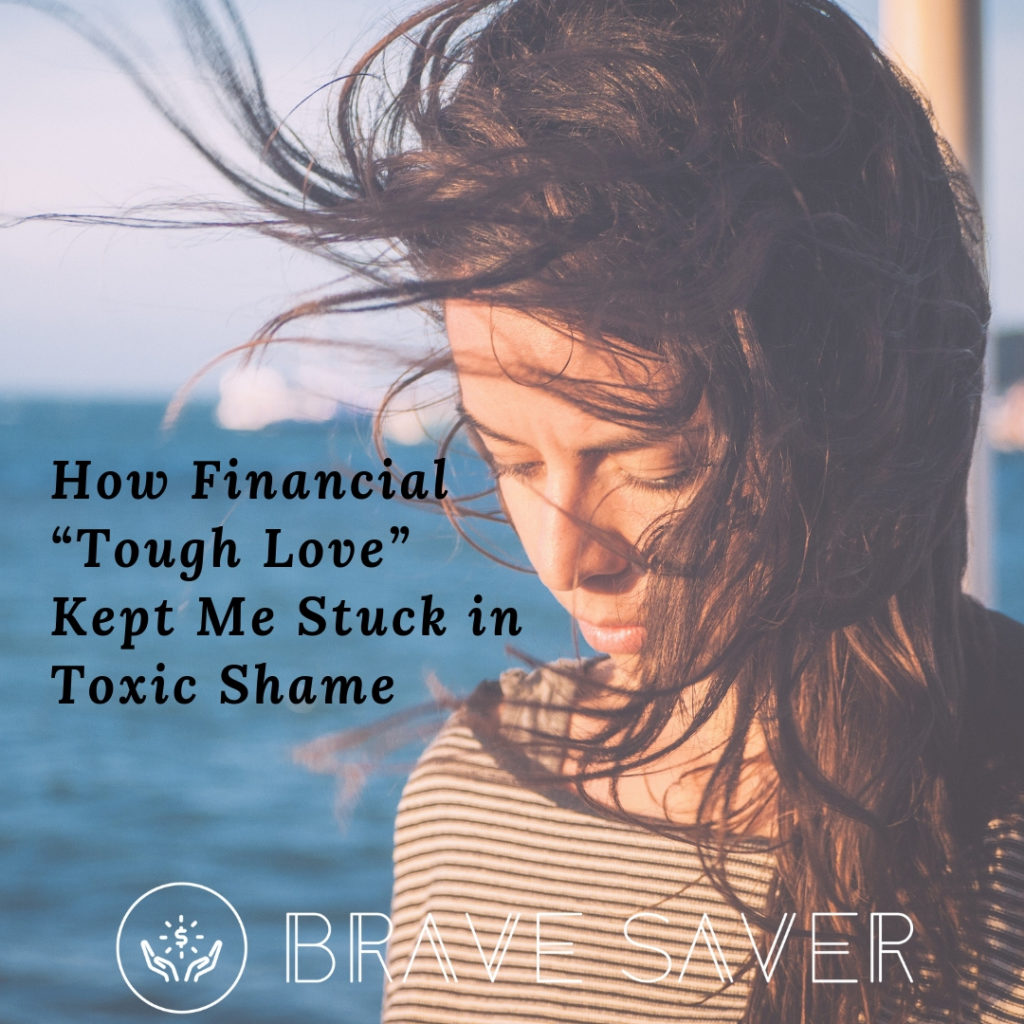
So much of the money advice out there is couched in a “tough love” approach. Finance experts justify this so-called tough love by saying it comes from good intentions of trying to help you improve your money management and build a better life.
But let me tell you a little bit about how this has often worked for me.
I’m stressed about money and looking for answers. But instead of solutions, I’m called “stupid” for making an incredibly common money choice. Like running up a credit card balance, borrowing for college, eating out “too often.”
In all of this personal finance advice, I’d just hear judgments: immature, ignorant, lazy, poor self-control, or simply “not wanting it” enough.
And maybe it works for some people. But for me, the financial tough love approach can be downright dangerous.
What's in this post
Is shame a useful motivating emotion?
Sometimes shame is called for. Healthy shame — guilt — acts as a natural check on our own behavior. It’s an emotion that alerts us to choices that are inappropriate or potentially harmful.
Healthy shame can arise in response to actions that hurt ourselves or others or aren’t in line with our values. With the awareness this shame brings us, we get the chance to course-correct, try something new, and make healthy changes.
But you have to know the difference between healthy shame and unhealthy shame. And that’s not a distinction I learned until well into my adult life.
Instead, my shame turned toxic, regularly bleeding over from what I’d done into who I was. The negative judgments I passed on my actions were automatically applied to my identity and self-worth, too.
Healthy shame might prompt a person to consider, “Maybe that was a poor money choice.” But my unhealthy shame pushed me to label and put myself down: “I’m just bad with money.”
How my financial shame spiral kept me stuck
What I thought of as my “tough love” approach to money and behavior management, however, was anything but loving.
It wasn’t about taking an honest and unflinching inventory of our problem areas. It was a pattern of putting myself on mock trial, already having every intention to burn myself at the stake.
My toxic shame used my financial situation as evidence to underline its basic thesis: that I was worthless.
The student loans I’d graduated with made me a burden on my husband. My crap credit was proof I was unfit for adult life, and again, a burden on my husband. My inability to find a job immediately after my internship ended, or later when we made a cross country move — also still a failure, also still a burden.
Where natural guilt and shame can provide an opportunity for self-evaluation and improvements — my toxic shame just cut my growth short. It put me in a loop of self-recrimination and feelings of failure that robbed me of the ability to change.
Instead of money mistakes being about a choice made in a moment that could be resolved and learned from, they became about who I was all the time. And when I was stuck in toxic shame, ultimately, I was and would always be a financial failure.
You can’t shame yourself into better money habits
All my financial missteps became fuel for shame that I wielded like a weapon, aimed at my own failings. I tried to use this shame to burn away the frivolous spending, the vain consumption, the weak will, the ignorance or inattention.
If I made it extremely shameful and painful to make a poor money choice, maybe I’d think twice before daring to do it again. It was punishment-as-deterrent — and it didn’t work.
If I scathingly judged my imperfections, burned them up, hated them — well that was better, isn’t it? Better than just letting those failings and flaws sit there, taking root like weeds, growing and becoming worse.
This pattern of putting myself on internal blast provided a moment of feeling in control, knowing that I hadn’t let myself off the hook. It made me feel
But this short-term self-satisfaction came at a high cost: my mental health.
What I forgot in all of this hot, stinking shame was that those failings and flaws I was targeting, the earth I was scorching: All of those things were also me.
“We can’t hate ourselves into a version of ourselves we can love.”
Lori Deschene, author of “Tiny Buddha”
All of this war-waging just turned my mind and heart and finances into a burnt-up battleground. There was nowhere for new habits to take root and grow. I was constantly shell-shocked, hollowed out, hurting — and I was doing it to myself.
And slowly this truth set in: I could not wear myself down into a person better with money. I couldn’t beat sloppy financial habits into submission.
Positive,
But I was too busy constantly tearing myself down to even think about starting this kind of construction. Shame kept me exhausted, scare, anxious, and ultimately undermined my ability to actually do any better.
4 ways to reframe your toxic money shame
I invested everything into the misguided idea that somehow, inexplicably, this shame cycle would mold me into the responsible, functional, in-control person I so desperately wanted to be.
But it didn’t — it just left me miserable and running on empty, unable to improve much of anything.
When I started challenging my shame and the self-criticisms that fed into them, however, that made all the difference. I was able to see myself as someone who wasn’t perfect — and didn’t always have to be. I could give myself room to stumble and be human. It opened up the possibilities for myself to grow, change, and operate
My toxic money shame still comes up, but I’ve found some effective ways of addressing it. Here are some strategies and tools that have helped me.
1. Put shame in its place
Shame is just a feeling. And feelings are not facts.
So fact-check your feelings of shame. Are you really a failure 100% of the time? Or can you think of at least one thing you did in the past day or week that went alright?
Left to its own devices, shame expands until it’s using up all the oxygen in our mental space. Shrink it down and put it back in its place.
You are so many more things than the one misstep your shamey brain wants to fixate on. Remind yourself how much your pet loves you, or how hard you’re working, and how much you’re doing.
Bring those amazing things about you back into focus and recognize all the amazing and beautiful ways you are showing up in your life, day in and day out. Shame might still be there, but next to all that — it’s smaller and easier to move past.
2. Seek professional mental health support
I highly suggest seeing a mental health professional (which I am not). There’s no replacement for the personal care and one-on-one help of seeing a qualified, licensed counselor or therapist. My therapist’s office has been the stage of some of the biggest breakthroughs and healing in my relationship with shame and money.
If you’re dealing with toxic shame, regular therapy or counseling is the most important investment you could make in your financial and mental health. Your mental health care provider can give you
3. Identify and step away from financial shame triggers
Think about the experts, topics, advice or situations that tend to trigger shame and kickstart your self-criticism cycle. You don’t have to keep engaging with people or topics that make you feel bad and guilty.
If all financial advice is this for you right now — you might need to take a break for a while. And that’s ok! There have been times when I had to stop tracking my finances so closely, because even totally normal and reasonable expenses would bring on a tidal wave of disproportionate guilt.
You can’t constantly be working on your money situation, and other issues might be more urgent and deserving of your attention. Step back, take time to rebalance and work on your emotional and mental health directly. Once you’re in a better place, you can work on your finances without it being so emotionally fraught and charged with shame.
4. Come to your own defense
If your shame gets out of hand and reaches “toxic” levels when money is involved, you can work on that. You can recognize when you are labeling yourself and passing negative judgments. Have rebuttals ready and become your own defender.
When my toxic shame says, “You should have known better than that,” I say, “It’s impossible to always know everything. I am still learning and that’s okay.”
Your brain starts on the track of, “Seriously, you bought that? You have no self-control or discipline.” You respond with “I’m not ‘out of control.’ I bought something I wanted, and that’s all this is.”
As I’ve practiced these shame-fighting tactics, my financial management has become healthier and more resilient. I’m less likely to spiral into feelings of worthlessness and depression when I make a poor choice or blow my budget. Instead, I can take a balanced look at what went wrong and make a plan for how to move forward.

Feature image courtesy of Nicolas Prieto via Unsplash.




22 Comments
Caveman
January 25, 2019 at 9:56 pmHuge topic so thank you for tackling it. Thank you for being so open about it.
As you rightly say, shame about your finances (or indeed anything else) doesn’t lead to change and it has a huge, negative, impact on mental health. What is really difficult about it is that you can end up in a negative downward spiral. As you say that means there is nowhere for the good things to take root and flourish. I found that I broke out of that when I forgave myself and allowed myself to be happy – that’s what led to a positive spiral.
What I can say also helped me was to say that even if I was ashamed of my actions that didn’t mean that I had to be ashamed of me. I wasn’t just my actions. The other thing was to break out of feeling like I was a victim (a bit like your point of coming to your own defence). To realise that I had control over my actions and the world. That realisation changed my life…the story of how I got there is for another time!
Good luck with your journey. It’s tough but you’re doing brilliantly!
Elyssa Kirkham
March 1, 2019 at 4:40 pmThanks for reading! I like that you point out that separating identity and actions actually helps us take accountability for what we’re doing and not acting like a victim. That’s an interesting idea!
Abigail @ipickuppennies
January 27, 2019 at 6:27 pmAs a depressive, I deal with a lot of guilt and shame that turns toxic. I sometimes have to tell my brain to shut up — out loud — just to get some peace and quiet. So yes, I agree that you need to fact-check your feelings and step away from triggers. At least until you’ve got things more under control. I’m glad you got away from the toxicity. I hope that continues!
Elyssa Kirkham
March 1, 2019 at 4:41 pmThank you for sharing your experience. I definitely have go-to responses and sometimes respond out loud. One that works well is, “This feels life threatening but it isn’t.” It’s a good reminder for me.
The Shutdown Shows Why Civic Engagement Must Be Part of Your Financial Plan - Brave Saver
January 29, 2019 at 7:43 pm[…] infuriating that people who are hard workers serving their country were shamed over the state of their finances in a crisis that was most definitely not of their own […]
The Daily Jukebox – Monday, January 28, 2019 – Wise Commerce
February 4, 2019 at 1:14 pm[…] When Financial “Tough Love” Turns to Toxic Money Shame- Brave Saver […]
Jill
February 6, 2019 at 5:14 amWonderful points. I dislike how people tie morality to money. ie: people who coupon clip are good or people who are wealthy must be better/smarter/bla bla bla. This kind of talk completely eliminates the factor that makes up 95+% of a person’s financial situation = luck. People are lucky to have parents that can help them through college, have free childcare, fewer medical expenses, social skills that help with employment, access to knowledge about personal finances, born in a developed country… I could go on.
Money is just a social construction. It is not tied to opinions of morality. One is not good or bad.
Elyssa Kirkham
March 1, 2019 at 4:42 pmThank you for the comment! This realization was huge for me, that my money behaviors had little to do with my worth, value, or “goodness” as a human. Privilege and advantages play a big part, as you pointed out.
Mysticaltyger
February 28, 2019 at 10:16 pmI think this was a very well balanced article. As you pointed out, a certain amount of guilt or shame can be good if it forces you to reconsider bad behavior…but beyond that, it goes from being helpful to harmful. I’m glad you don’t go the opposite extreme and say “guilt and share are always bad”. Those are the reactions I typically see. Ideally we would never need guilt or shame to get us to correct our behaviors, but that’s not real life.
Elyssa Kirkham
March 1, 2019 at 4:45 pmThank you for your feedback! I agree that balance is important, and most people don’t have it. For anyone trying to do better financially, knowing where they fall on the “shame spectrum” can help them with that. If they tend to not feel healthy guilt/shame or ignore it, that can lead to irresponsible behaviors or setbacks. In my case, however, I leaned way too far into shame and pulling myself out was necessary to build more intentional behaviors and a healthier relationship with money.
Anything about this is really important – Merchant Solution Plus
March 1, 2019 at 2:00 am[…] How Financial “Tough Love” Kept Me Stuck in Toxic Shame […]
Midwestisbestest
March 1, 2019 at 4:27 pmThank you very much for this thoughtful article. I agree with the underlining thesis that financially secure people have a moral superiority and those who struggle financially only have themselves to blame. There are plenty of people who make terrible money choices, but there are just as many people who are doing all the things advised to make more money, reduce debt and manage their finances and still don’t meet the markers for financial success. Small time spending changes aren’t going to buy a house and trying to dig out of student dept can take years. So much advice ignores the humanity of those trying to manage in a very broken system.
Elyssa Kirkham
March 1, 2019 at 4:47 pm“financially secure people have a moral superiority and those who struggle financially only have themselves to blame.” << I'm not sure if this is missing a word, but this is not at all the thesis of the post. I don't think financial security has anything to do with being a good person, and when people struggle financially there are many, many factors that can play into that. I agree wholeheartedly with the rest of your comment. There's more to money than just behaviors — circumstances, as well as mental health and how we're wired. Understanding and allowing for our own humanity helps us deal more directly with reality and have more impact in the areas where we do have influence or control.
Angela @ Tread Lightly Retire Early
March 1, 2019 at 5:09 pmThis is such a fabulous response to the all or nothing type of advice. You are not your net worth. Why is that such a hard thing for so many people who give advice to accept? Language matters so much more than we give it credit.
Women’s Personal Finance Wednesdays: Week 24 Roundup - Tread Lightly, Retire Early
March 6, 2019 at 3:50 pm[…] How Financial “Tough Love” Kept Me Stuck in Toxic Shame Brave […]
Mad Money: How the Wrong Financial Advice Can Drive You Crazy - Brave Saver
June 10, 2019 at 12:44 am[…] can trigger toxic money shame that gets in the way of […]
My Career Break Failed Because Fear Got the Best of Me - Brave Saver
August 1, 2019 at 1:03 pm[…] of the most difficult emotions to manage because it’s inherently instinctive, not rational. I can reason with shame, self-doubt, jealousy, anger, or other uncomfortable emotions. But I can’t necessarily talk my […]
Build Self-Awareness for Effective Money Management | Brave Saver
September 11, 2019 at 1:01 am[…] thoughts related to my money touched on some deep hurts and toxic financial shame. I often tried to act like others, because it was easier and less painful than looking at my own […]
The Fuck Up Fund: Save for Your Messy Bitch Moments - Brave Saver
September 20, 2019 at 3:38 am[…] against the elevated chaos that comes with just being me. It’s my extra ammo against toxic financial shame that would make me feel […]
You Can’t Really Manage Money (or Anything Else) Until You Can Manage Yourself - Brave Saver
October 9, 2019 at 10:59 pm[…] As I ground to a halt, all the things that had been blurred by my hurried pace started to come into focus. I saw hard work for what it was: my last-ditch effort at covering up my messiness and toxic shame. […]
How Financial Advice Triggers Painful Money Shame – Collecting FI/RE Wisdom
October 13, 2020 at 8:31 pm[…] Money shame is not a healthy emotion to use a tool for financial change. Using it to push ourselves, or allowing others to do the same deepens emotional wounds. And we are often at the greatest danger to ourselves and our financial health when we feel wounded, trapped, and alone. […]
Personal Finance: The rise of the quacks – Naked Beta
November 21, 2020 at 1:25 pm[…] this screaming and shouting is not for […]